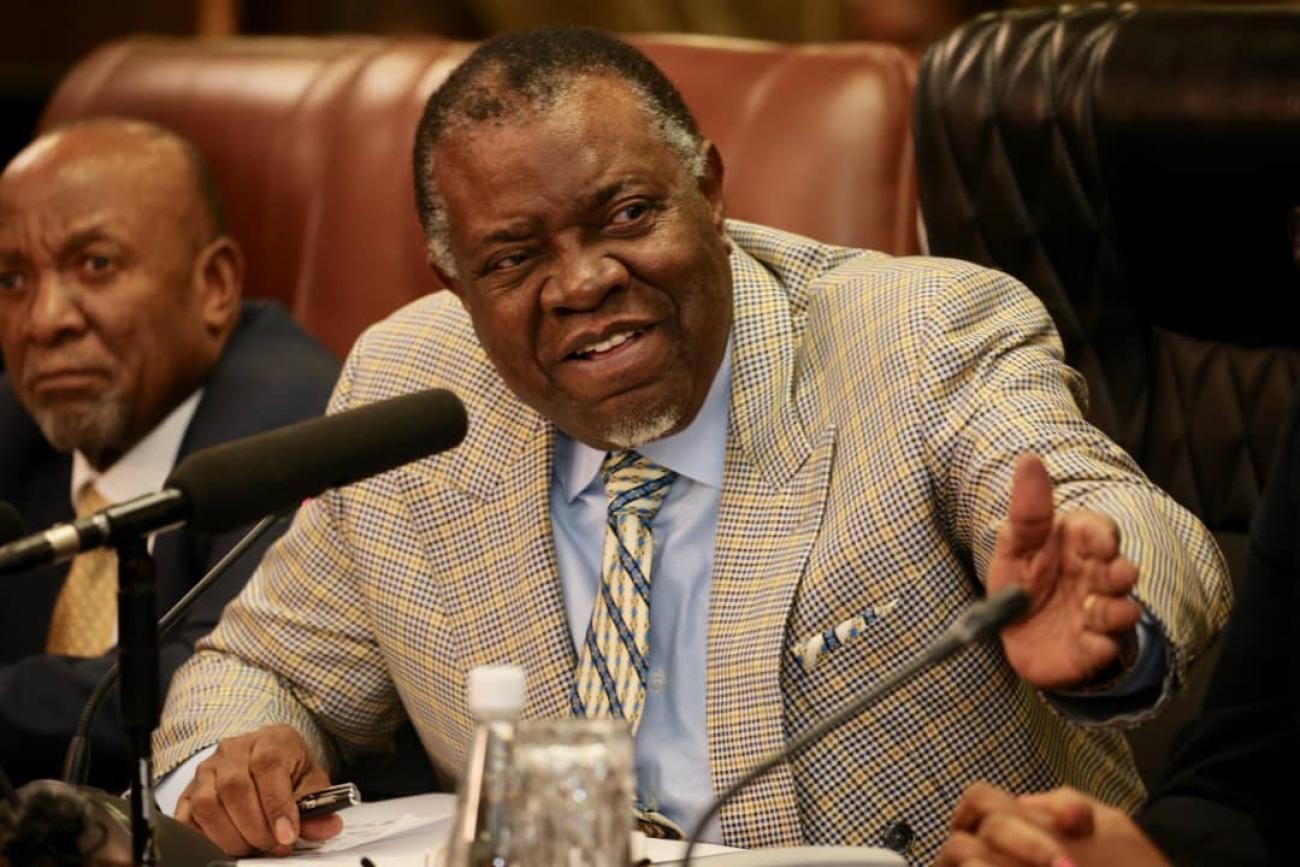Namibia declares State of Emergency due to COVID-19

The President of the Republic of Namibia, H.E. Dr. Hage G. Geingob declared a State of Emergency on 17 March 2020 in the wake of the global COVID-19 pandemic.
“The lives of our people are of paramount importance, and cabinet has decided we should declare a state of emergency,” Geingob announced during a press briefing held at State House in Windhoek on 17 March 2020.
Subsequent to a cabinet meeting and a briefing by the Minster of Health and Social Services (MoHSS), cabinet agreed to specific measures for Namibia’s preparedness and response to the COVID19 outbreak which was instituted to curtail the spread of COVID-19.
The following measures are to be instituted:
Points of Entry
1. Suspension of the issuance of visa on arrival at the Hosea Kutako International Airport and implementation travel ban of foreign nationals (by air and sea) from affected countries, namely Schengen States, China, Iran, Korea, United Kingdom, United States of America and Japan. The travel ban to be reviewed regularly.
2. A temporary travel suspension for 30 days for Namibians or Permanent Residents functionaries except for special cases with prior authorization with Ministry of Health and Social Services (MoHSS) and Home Affairs and Immigration ( MAI). Exceptional cases will include, persons seeking medical treatment, essential services like humanitarian assistance, truck drivers bringing food and other essential commodities, Namibians returning among others. Compulsory screening will be conducted for verification and quarantine imposed were necessary;
3. All leisure, business and social travel like tourists is suspended, and Namibians who are residents in other countries considering to visit Namibia to postpone such visits;
4. In order to facilitate work, international meetings, should either be attended by officials from our missions abroad or participation through video/teleconferencing.
5. Direct that all international scheduled flights, private chartered flights to only land at Hosea Kutako International and Walvis Bay International Airports;
6. All scheduled passenger flights, including private chartered flights to and from countries where there is active local transmission be suspended for 30 days with immediate effect. This suspension is exclusive of cargo and emergency flights to and from Namibia;
7. Conduct strict disinfection of aircrafts and training of airport staff on infection prevention and control and provision of appropriate Personal Protective Equipment (PPE);
8. Mandatory screening for COVID-19 to be conducted at all Points of Entry in the country. Thermo guns to be placed at all checkpoints and roadblocks for screening inland travellers;
9. All returning Namibians and permanent residents arriving from countries at high risk or from affected other countries will be subject to supervised self- quarantine from 14 days (self-quarantine for mild/asymptomatic persons); and
10. South African Borders, including Air Travel to remain open to serve as points of entry for Namibians returning home and exit point for visitors from Namibia, and to facilitate trade between the two countries.
Uniformed forces
11. Deployment of multi-disciplinary professionals like Health Professionals, logisticians and other professionals from the Uniformed Services (Ministry of Defence, Namibian Police Force (NAMPOL)and Correctional Services) to complement their counterparts at the MoHSS and the National Health Emergency
Management Committee and funds to be availed for training, equipment, and materials:
11.1. Correctional officers, court officials, police and City Police to be issued necessary infection prevention materials when conducting their duties;
11.2. All court hearings to be conducted without attendance by members of the public;
11.3. All pending matters in court to be postponed in absentia for 30days;
11.4. Provide separate detection facilities for new incoming accused person or suspects, and that routine screening should be conducted before admission;
11.5. Implement decongestion procedures at police cells;
11.6. For a period of thirty (30) days following the adoption of this measure, visits to correctional facilities and police holding cells be restricted to limited numbers of family members as determined by the relevant authorities;
Health facilities
12. Mandatory immediate reporting of all suspected cases from both State and Private Health Facilities, using set case definitions as well as taking specimens and packaging according to the set standard operating procedures (SOPs):
12.1. Introduction of triage system and mandatory screening at all Health Facilities in the country and that the Ministry of Health and Social Services coordinates the provision of Personal Protective Clothing/Equipment to all Ports of Entry officials;
12.2. Include private facilities of the University of Namibia (UNAM) and Namibia University of Science and Technoly (NUST), and other allied health services sectors in the response depending on need;
12.3. All health care workers to comply with the notification, prevention and control of notifiable diseases.
General Public
13. For a period of thirty (30) days following the adoption of this measure, large public gatherings (of not more than 50 people) be suspended; schools, religious gatherings, customary, weddings, funerals, and all parades for uniformed forces to be suspended until further notice;
14. For non-COVID-19 related funerals, families (organizers) are strongly advised:
14.1. To promote hand washing, respiratory hygiene and social distancing at the event;
14.2. Advice mourners to wear masks when coming to all activities related to the funeral;
14.3. Deaths and funerals related to COVID-19 will be handled by the government with psychosocial support to the family;
14.4. For a period of thirty (30) days following the adoption of this measure, owners of public transport vehicles to provide hand sanitizers and masks to all their clients/passengers and enforcement the laws on overloading strictly;
14.5. For a period of thirty (30) days following the adoption of this measure, precautionary measures to be put in place during livestock auctions so as to prevent transmission of the virus in lien with the directive on minimizing mass gatherings as determined by relevant authorities and stakeholders;
14.6. For a period of thirty (30) days following the adoption of this measure, trade fairs, sports, events, and demonstrations to be postponed;
14.7. Accommodation establishments throughout the country to:
• Provide sanitizers and masks for all staff
• Educate guests to have own protective measures
• Have full travel history of the guests and next destination Contact
health authorities immediately when they notice guest being ill,
especially with symptoms related COVID-19
• Adopt and implement WHO Guidelines on Workplace
• Prevention of COVID-019, including training of staff members of accommodation establishments on appropriate Infection Prevention and Control measures.
15. Water supply to communities is key in the prevention of COVIT-19, and Service Providers are urged to make sure that water is available to the public, through water tanker services and other means;
15.1. Scale up the provision of water supply at informal settlement and other strategic places through water tankers;
15.2. Public awareness messages and campaigns should be intensified using all media avenues and platforms to reach every community member in all regions; and
15.3. Shops, shopping malls and supermarkets to put measures in place to ensure and enhance hygiene at all time to protect all clients and customers, such as the provision of alcohol-based hand sanitizers, and face masks for employees.
Economic Related Resolutions
16. Offices/Ministries and Agencies should request their respective State-Owned Enterprises to explore the possible impact of the Coronavirus on their businesses;
17. Namibia to engage South Africa, as a matter of urgency on the reciprocity of visa arrangement for business people, and on the Exit and Entry Points that should not be closed to allow for the flow of trade and further mitigate shortage of suppliers (consumable goods) to Namibia;
18. The cattle auctions should be allowed to continue provided that the number of people is limited to the Traders and no children should be allowed at the auctions;
19. The Ministry of Finance and Bank of Namibia to conduct a thorough impact assessment of the COVID-19 on the economy, as well as, on the financial stability and the outcome should be presented at the next meeting of Ministerial Committee of the Economic Sectors; and
20. The Ministry of Industrialization, Trade and SME Development should implore upon the cosmetic industry to invest on manufacturing of sanitizers and other protective products to assess the impact of COVID- 19.
-END-
Written by







